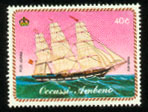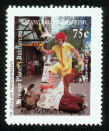When news that an Auckland film buff had discovered a rare print of an early Doctor Who episode at a Napier garage sale hit the newspapers, a few people around the country were wandering if it wasn't a case of 'here we go again'.
The reason for the scepticism was that the film buff turned out to be veteran New Zealand anarchist Bruce Grenville, well known in anarchist circles for the creative ways in which he explores alternatives to our current authoritarian society.
 It should be pointed out that the Doctor Who discovery appears to be genuine. New Zealand Doctor Who Fan Club members contacted Grenville to arrange a screening and verified that it was, indeed, the missing episode, and Grenville then had the print sent to the BBC to be checked by their restoration team. But in the 1970s and 1980s Grenville was the mastermind behind an extraordinary hoax involving the creation of an imaginary state: Occussi-Ambeno.
It should be pointed out that the Doctor Who discovery appears to be genuine. New Zealand Doctor Who Fan Club members contacted Grenville to arrange a screening and verified that it was, indeed, the missing episode, and Grenville then had the print sent to the BBC to be checked by their restoration team. But in the 1970s and 1980s Grenville was the mastermind behind an extraordinary hoax involving the creation of an imaginary state: Occussi-Ambeno.
The group behind the hoax chose the island of Timor as the location for their fictional country. There was actually an area called Occussi-Ambeno on the north-west coast of the island. Originally a Portuguese enclave in the Dutch-held western half of the island, Occussi-Ambeno disappeared officially from our maps when the Indonesians invaded East Timor in 1975.
With little more than this as a starting point, Grenville and his comrades proceeded to create a state with its own unique history and bureacracy. They invented a succession of rulers going back to 1848, when seven tribes united for protection from the interloping Portuguese. Independence was acheived in 1968 and from then the seven provinces had full internal autonomy.
The scam took off in earnest when its creators began to print stamps, letterheads and other material.
In the early 1970s articles began to appear in British and American philatelic magazines about Occussi-Ambeno and its stamps, and some income was generated through the mail-order sale of stamps.
Diplomatic relations were established with a number of other tiny states, including Monaco and Liechtenstein.
In 1973 Occussi-Ambeno hit the headlines as the first state to recognise the newly established Republic of Minerva, a coral reef near Tonga. The New Zealand Herald put the story on its front page under the headline, 'One World leader Recognises Reef' Three months later Tonga invaded and annexed Minerva, but Occussi-Ambeno lived on, its leaders no doubt encouraged by the media attention.
Soon after this Grenville got a job in an office which gave him access to professional typesetting and xeroxing facilitites. Occussi-Ambeno started to issue a flood of press releases, many of which were picked up and published by the world's media.
 But the group's big break came in 1977. A European consortium wrote to the Occussi-Ambeno consulate in New Zealand offering substantial graft payments if it could induce the Sultan to sign a contract giving the consortium exclusive right to produce and sell Occussi-Ambeno stamps to collectors around the world. The "rulers" of Occussi-Ambeno were able to upgrade their stamps to full-color glossy offset designs, and received payments, plus a considerable income from selling their portions to collectors, before the consortium cottoned on and cancelled The contract!
But the group's big break came in 1977. A European consortium wrote to the Occussi-Ambeno consulate in New Zealand offering substantial graft payments if it could induce the Sultan to sign a contract giving the consortium exclusive right to produce and sell Occussi-Ambeno stamps to collectors around the world. The "rulers" of Occussi-Ambeno were able to upgrade their stamps to full-color glossy offset designs, and received payments, plus a considerable income from selling their portions to collectors, before the consortium cottoned on and cancelled The contract!
 The creators of Occussi-Ambeno used the concept of a fictional state to promote a range of libertarian and ecological ideas. The country has no anti-drug laws, and in fact has a booming magic-mushroom industry. Alternative technologies are promoted in stamps featuring wind-powered vessels from Transonic Marine, Occussi-Ambeno's shipping line. The national airline uses helium-filled zeppelins, which were featured on a 1983 series of stamps marking the 200th anniversary of the first human fight in balloons Occussi-Ambeno also supported the anti-nuclear movement. As well as issuing stamps with the CND logo, Ocussi-Ambeno took out a half page advertisement in a book published by the New Zealand branch of the CND showing a stamp depicting a spacesuited figure blasting everything in sight into oblivion and below it the words "Nuclear Escalation?".
The creators of Occussi-Ambeno used the concept of a fictional state to promote a range of libertarian and ecological ideas. The country has no anti-drug laws, and in fact has a booming magic-mushroom industry. Alternative technologies are promoted in stamps featuring wind-powered vessels from Transonic Marine, Occussi-Ambeno's shipping line. The national airline uses helium-filled zeppelins, which were featured on a 1983 series of stamps marking the 200th anniversary of the first human fight in balloons Occussi-Ambeno also supported the anti-nuclear movement. As well as issuing stamps with the CND logo, Ocussi-Ambeno took out a half page advertisement in a book published by the New Zealand branch of the CND showing a stamp depicting a spacesuited figure blasting everything in sight into oblivion and below it the words "Nuclear Escalation?".
 To some people the idea of anarchists creating a state, however fictional, may seem hypocritical. But it should be emphasised that Grenville saw it as a opportunity to satirise the state. At the same time it allowed him and others to excercise their imaginations and develop their skills in printing and other areas. And of course it provided them with funds to finance other projects, including the purchase of a printing press. But above all it was a lot of fun. Perhaps we should let Bruce Grenville have the last word:
To some people the idea of anarchists creating a state, however fictional, may seem hypocritical. But it should be emphasised that Grenville saw it as a opportunity to satirise the state. At the same time it allowed him and others to excercise their imaginations and develop their skills in printing and other areas. And of course it provided them with funds to finance other projects, including the purchase of a printing press. But above all it was a lot of fun. Perhaps we should let Bruce Grenville have the last word:
"Apart from its ability to finance other projects you may have, the doors that are opened have to be experienced to be believed. The confusion that you can throw into the already complex world geopolitical scene is also fun. We feel that every possible unorthodox vehicle should be explored in the fight for freedom from Statism. Setting up an effigy of the sacred cow to satirise it appears to be one they have not taken into account at all."